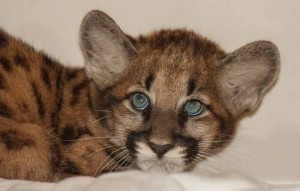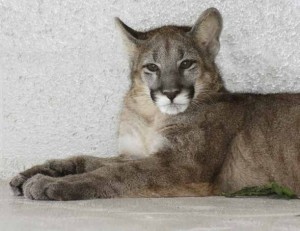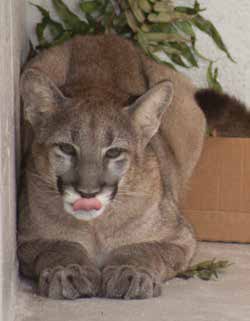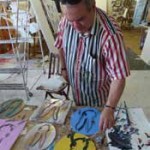Cooperative efforts save two more PANTHER KITTENS
by Tim L. Tetzlaff
Naples Zoo Director of Conservation
 Last summer, Naples Zoo created a permanent home for a blind panther that also included space away from the public area to give temporary care for injured or orphaned panthers. Already, the Zoo has taken in two more panthers. The first arrival was a now seven-month-old female that was orphaned in October when her mother was killed by a vehicle. The latest arrival came in January – a 2 to 3 month old male. Naples Zoo’s carnivore team provided care for these young cats behind the scenes as part of a collaborative effort with the U.S. Fish and Wildlife Service (USFWS) and Florida Fish and Wildlife Conservation Commission (FWC). As the population of panthers and people continue to grow, partnerships will be key to both educate Floridians and care for the state’s wildlife.
Last summer, Naples Zoo created a permanent home for a blind panther that also included space away from the public area to give temporary care for injured or orphaned panthers. Already, the Zoo has taken in two more panthers. The first arrival was a now seven-month-old female that was orphaned in October when her mother was killed by a vehicle. The latest arrival came in January – a 2 to 3 month old male. Naples Zoo’s carnivore team provided care for these young cats behind the scenes as part of a collaborative effort with the U.S. Fish and Wildlife Service (USFWS) and Florida Fish and Wildlife Conservation Commission (FWC). As the population of panthers and people continue to grow, partnerships will be key to both educate Floridians and care for the state’s wildlife.
SASSY THE SURVIVOR
FWC Panther Biologist Mark Lotz has been involved in every panther coming into Naples Zoo including both of the new kittens. “Having a local resource like the Naples Zoo has proven invaluable. We had no idea that we’d be relying on them so quickly and as frequently. Because we can get panthers there fast, the cats are more relaxed and can quickly get the specialized care they need,” Lotz said. “If we don’t sleep, the Zoo staff doesn’t sleep. We rescued the female panther near Collier Seminole State Park at 11:30 p.m. and the Zoo’s Director of Animal Programs Liz Harmon and the Zoo’s vet Lizzy Arnett- Chinn met me at the Zoo after midnight to take care of the emaciated kitten.”
Now named Sassy, this female panther beat the odds. “Sassy is a tough girl. After her mother was killed, Sassy survived on her own for nearly a month while her siblings did not,” shared Harmon. “Even so, she needed careful attention and our team rose to the occasion. In addition to achieving a healthy weight, she required multiple treatments for the pinworms and hookworms she picked up in the wild.” Zoo veterinarian Dr. Arnett-Chinn oversaw her progress throughout and Sassy now looks to be in excellent health. After her temporary care in Naples, Sassy moved to the Palm Beach Zoo, another facility that has also met the rigorous criteria for accreditation by the Association of Zoos and Aquariums.
 LOST KITTEN FOUND
LOST KITTEN FOUND
The latest arrival, a two to three month old male, was found in an agricultural area near Lehigh Acres. From the various panther footprints, Lotz and FWC Panther Team Leader Darrell Land pieced together a scenario where two mothers with kittens appeared to cross paths and somehow this male got separated from his family and options for reuniting him were too risky. Darrell was grateful for the new facility, stating, “When faced with making a decision about what to do with an orphaned or injured panther found in the wild, having a well-equipped facility like the zoo nearby provides us the option of bringing the animal in for temporary or long-term care, an option that has not always been available.” Naples Zoo will care for this male kitten until USFWS and FWC arrange a permanent home for him.
Randy Johnson, Florida Station Branch Manager for the Sakata Seed America Research Station where this kitten was found, can understand how multiple cats could be using that land and how hard it could be to locate them. “We’ve got acres and acres of woods between us and the airport and 50 acres of our 125-acre station are natural with cypress trees and a retention reservoir. We see plenty of wildlife attracted to our area like bears, wood storks, and sand hill cranes. And about a year ago, we started finding more panther tracks in the fields. Perhaps not coincidentally, we also started seeing fewer of the raccoons that eat our crops.
Being a good steward of the land can pay off in unexpected ways,” shared Johnson.
 PARTNERING FOR PANTHERS
PARTNERING FOR PANTHERS
These rescues illustrate how important different lands are to panthers. Naples Zoo’s Director of Conservation Tim Tetzlaff explains, “Conserving and restoring the natural world we all rely on is the long game and partnering is the greatest way to reach those long term goals. We need everyone: private landowners, wildlife agencies, dedicated individuals, and nonprofit wildlife organizations like zoos.”
David Shindle, USFWS Florida Panther Coordinator, sums it up this way: “The Naples Zoo at Caribbean Gardens is an integral partner in Florida panther conservation efforts. The U.S. Fish and Wildlife Service values the investment made by Naples Zoo staff and their supporters in constructing a facility specifically designed for the temporary housing of injured or orphaned panthers removed from the wild. This investment, combined with the Naples Zoo’s long standing commitment to providing science based education and support for field conservation efforts, is a model for the private and public partnerships that will be crucial as we move forward with Florida panther recovery.”
MARCH LECTURE SERIES
In addition to the Zoo’s temporary care facilities for panthers, visitor education at the Zoo’s panther habitat engages guests in a balanced discussion of living with larger predators that are endangered species. Join the Zoo on March 24 as we welcome David Shindle from the USFWS for our evening lecture series. For more information and to RSVP, visit www.napleszoo.org/speakers.
Far from the simple menageries of past, today’s nationally accredited zoos are centers of learning and natural crossroads for biologists, educators, environmental scientists, and researchers – as well as for students, conservationists, and all animal lovers. Naples Zoo at Caribbean Gardens is a trusted, private 501(c)(3) nonprofit serving wildlife and families here and around the world. More information at www.napleszoo.org.


Leave a Reply
Want to join the discussion?Feel free to contribute!